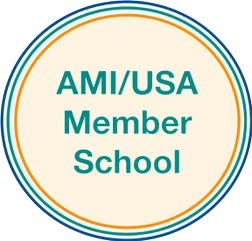Frequently Asked Questions
Here are some of the questions we hear most often about Montessori education. Along with growing interest and acceptance, there are also questions and misconceptions.
-
What are the main differences between Montessori and traditional education?
In Montessori classrooms, children use the Montessori materials to learn at their own pace. Materials are based on human development. Student progress is skill-based and assessment uses a combination of observation, demonstration and portfolio review.
Traditional classrooms follow a curriculium and timeline set by adults. Students follow a pre-determined path and their progress is based on testing and grades.
Click here for more information about this topic.
-
Why does Montessori have multi-age classrooms?
Multi-age classrooms allow each child to work through the Montessori curriculum at their own pace while also enjoying a community of their peers. They have experiences of being both leaders and followers and learn to collaborate on projects with others.
-
Are Montessori schools religious?
Sometimes, but CMS is not. Our community is very diverse and we respect and learn about many different cultures and religions.
-
Is Montessori a franchise?
No, Montessori is not a franchise. The term Montessori is not trademarked and anyone, regardless of training, experience or affiliation can open a “Montessori” school. We encourage families who are researching Montessori schools to verify the authenticity of their chosen program.
Community Montessori School is a non-profit school run by our Executive Director with oversight by a Board of Directors. We have one school, located in Georgetown, Texas and are not affiliated with any other Montessori schools.
-
Are Montessori schools accredited?
Dr. Montessori founded AMI (the Association Montessori Internationale) in order to uphold the principles of the educational method she developed. Community Montessori School upholds AMI standards and is a recognized member school. CMS is also licensed by the state of Texas as a childcare center.
-
Isn’t Montessori just a preschool?
The Montessori approach is best known for early childhood education but Dr. Montessori developed her approach to encompass all of child development. CMS has programs for students from 12 months to eighth grade.
-
If children are free to choose their own work, how do you ensure that they receive a well-rounded education?
The Montessori classroom is structured to have both freedom and limits, allowing children to make choices for themselves while also learning how to function harmoniously in a group. Students are guided in their work by the classroom teacher or guide, who ensures that all areas of the curriculum are presented and practiced.
The Montessori approach is holistic and studies show that Montessori students perform at high levels academically, emotionally, and socially when compared to students educated in traditional settings.
-
Montessori classrooms don’t look like regular classrooms. Where are the rows of desks? Where does the teacher stand?
Montessori classrooms are child-centered. The teacher moves around the room, from child to child, giving lessons and supporting students. The emphasis is on the child's active experience with the materials.
-
Are Montessori schools as academically rigorous as traditional schools?
Yes. Montessori education encourages in-depth exploration of concepts and learning how to learn, rather than teaching to the test or memorizing facts. The success of CMS students is visible in the experiences of our alumni, who have found success in a variety of high schools, universities, and careers.
-
CMS goes through eighth grade. How are students prepared for high school?
In Montessori schools, children learn how to learn. They develop confidence and a strong sense of self. The collaborative enviornment builds social skills and the curriculum encourages critical thinking and problem solving - all of which are great preparation for high school as well as life.

